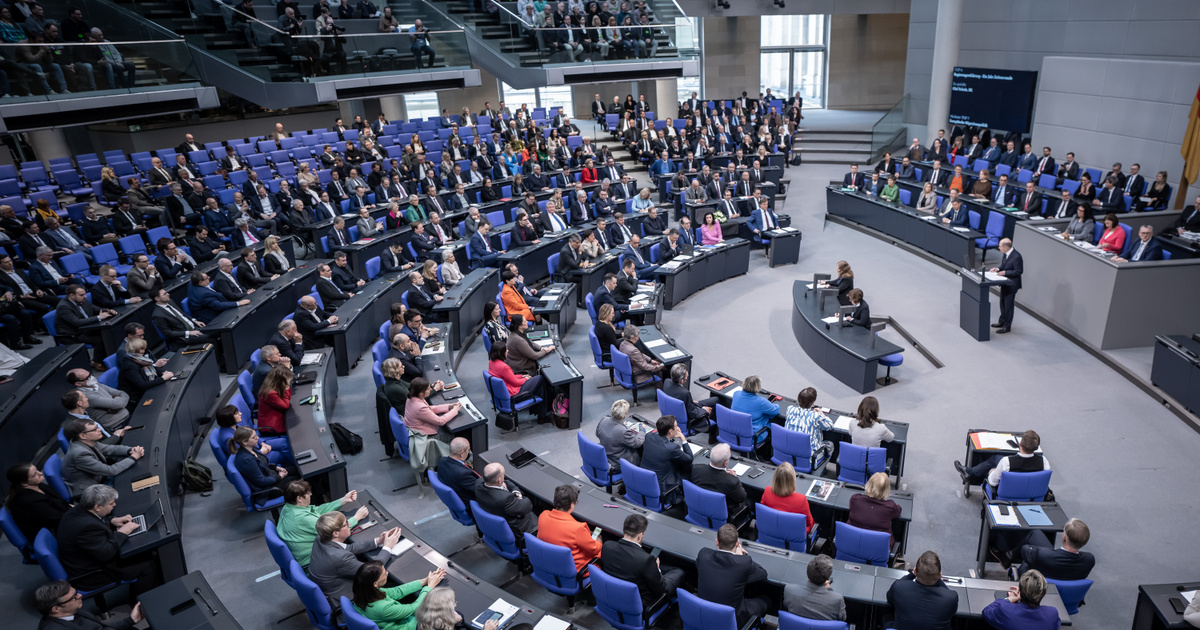On March 17, with 400 yes, 261 no, and 23 abstentions, the German legislature, Bundestag voted for A bill that, according to some media, radically reforms the German electoral system.
In most places in the press you can read about a reduction in the number of seats: the new election law would increase the number of representatives to a maximum of 630 people, which would obviously reduce the number of members of the Bundestag, despite the fact that, as a general rule, only 598 seats would be distributed On the parties that entered the House of Representatives.
However, after the 2021 elections, 736 representatives have finally been able to start their work in the 20th Bundestag. How did this happen?
Burden and compensatory mandates
In order to understand what kind of electoral reform the representatives voted for on March 17, we must first examine what it has been up to now.
The Germans essentially have an electoral system similar to the Hungarian system, so-called. Until now, their representatives have been elected in a mixed electoral system: one voter has two votes, one for the candidate in their district, the other for a party list.
However, unlike the Hungarian system, this did not mean that the electoral system contained both majority (winner takes all) and proportional elements.
Because the German electoral system is the so-called “personal proportional system”, in which the two votes are not independent of each other, as in Hungary: the number of seats obtained in individual constituencies determines the number of additional representatives from the list who can enter the Bundestag .
For clarity, let’s take a concrete example! The state of Saarland is the least populous state, if you do not count the cities that serve as states. There are only four congressional districts in the province, but a total of 9 represent the province in the federal legislature.
In 2021, the SPD won the most votes in each of the four constituencies, including associated states. In addition, in the list, most people chose the Social Democrats, but this did not bring an additional mandate to the Social Democrats, but instead gave two mandates to Merkel’s former CDU and one each to the liberal FDP, far away. Right Alt for Germany (AfD) and leftmost link.
The reason for this is that – unlike the Hungarian electoral system – the voting lists are designed primarily to compensate for votes awarded to individual candidates, not to win additional mandates.
Delegations are distributed by looking at the roster scores achieved by the parties and then comparing this to whether the mandates won in the individual districts are distributed in the same proportion.
Since 100 percent of the electorate in the Saar region did not vote for the SPD on the list, but “only” 37.1 percent of the electorate, in addition to the four individual mandates, additional mandates were allocated to other parties in the province. Until the percentage of representatives meets the percentage of votes given to the list.
There is not only compensation, but also the so-called bypassing the states (Überhangmandat). These are mandates when a party gets more mandates than justified by the results of the list. Since only 37.1 percent voted for the SPD on the list in the Saar region, two and a half of the four seats it won in the province were staggered – this burden was offset by other parties.
At the same time—since the number of representatives from Saar, as compared to the number of inhabitants, is greater than that of the other provinces—in this case the other provinces also obtain additional mandates, in order to fulfill the principle of equality of vote (by which the vote of one person is worth the same The value of the other, regardless of his education, economic status or – as in the present case – of his geographical location) they can comply with.
Because of excessive mandates and compensation, the Bundestag has never had the same number of members.
In the last election in 2021, for example, 138 compensation mandates were made, compared to 111 in 2017.
The five percent threshold, which is not always five
The other special rule is caused by the five percent entry threshold, or more precisely, the exception to it. In the German electoral system, as in other countries, votes cast only count for parties in which the party reaches five percent nationally within the mandate. However, it differs from the rules of other countries in that
If a party wins at least three individual constituencies, regardless of whether it does not pass the five percent threshold on the list, the list votes also matter.
Thus, for example, the amorphous far-left Linke, who serves both neo-leftists and workers in Berlin, would have been entitled to 36 compensation seats with only 4.9 percent of Germans voting for the party led by Janine Whistler and Martin Scherdewan, but drawn Three constituencies have individual candidates.
A new electoral reform recently adopted would eliminate both of these above-mentioned elements, with little change. Because the electorate will continue to cast two votes and there will still be compensatory mandates
The tiered states will not be compensated by new mandates granted to other parties, but simply the representative who wins the tiered state will not enter the Bundestag.
According to the proposal, the “hangover” representatives who won the smallest percentage in their district would lose their mandate. In addition, in addition to minority parties, the aforementioned exception to the five percent threshold would also be removed — so Link would not have won a mandate in 2021, for example. By abolishing the tiered states, it would be possible to assert that the Bundestag always has 630 members.
Can CSU and Linke really be eliminated in this way?
The motion was voted on by the representatives of the current government, i.e. the SPD-FDP-Green Party, also known as the Traffic Light Coalition because of the party colors, while it was rejected by the opposition – the CSU, which only started in Bavaria. , but they are collaborating in a partisan alliance with the CDU, and Linke will challenge the already adopted law in the Constitutional Court, as they believe it is unconstitutional.
In addition to the decrease in the number of mandates to be obtained – more representatives means more government funding – they are troubled by the strict observance of the five percent threshold: Linke increased his mandates thirteen-fold thanks to the fact that only 4.9 percent of the list voted for them, but they won Also with three mandates separately. , so instead of 3 states, they finally got thirteen times that number, 39.
The CSU, which started exclusively in Bavaria, is also troubled by the latter: despite having performed consistently well in elections so far, their electorate is decreasing year by year. Since they only compete in one province, if they don’t reach five percent nationally, their representatives won’t even get into the Bundestag, regardless of their results in Bavaria. In 2021, the party led by Markus Söder won in 45 constituencies out of 46 Bavarian states, while 5.17 percent of Germans voted for them at the national level.
However, according to the New Reformation, there could be a scenario in which the CSU would individually win almost all Bavarian constituencies to nothing, given that they do not pass the five percent threshold, and therefore will not receive a mandate in the end.
Thus, the Bavarians will remain virtually without representation in the Bundestag.
For them, it could be one of the way out if in the future they fully integrate into the CDU, which formed a joint coalition after the elections, but for this reason, it is clear that the balance of power will be in favor of the CDU because of the five percent rule.
Why was reform necessary?
The simplest answer to this question is, in short, taxpayers’ money, because the national weakness of the CDU-CSU-SPD alliance means that
More and more parties won tiered seats, which required more and more compensatory seats to be allocated.
And more representatives means more costs – in the 2023 budget, which is the biggest challenge for the coalition government so far, for example, Deutsche Welle according to 1.4 billion euros should be allocated to the Bundestag.
Also – as does Der Spiegel reminds him – The large number of representatives can also cause logistical problems: more representatives need more seats, and if the Bundestag expands at the current rate, it is conceivable that the existing building will simply not be suitable for holding plenary sessions in the future.
The government led by Olaf Scholz has also argued that compensation due to tiered mandates is complex for the German average, so it would be easier for voters to interpret results and coalition math on election night if the Bundestag operated with a fixed number of members.
What then?
As mentioned earlier, CSU and Linke have turned to the Constitutional Court in the hope that they can prevent Germans from voting under the following system in the next federal election in 2025.
It is not currently clear that the proposal is truly unconstitutional.
The electoral system would still be relative, and it is not considered unconstitutional that the proposal did not have the support of the largest opposition party, the CDU-CSU coalition, so it was only voted on by the Traffic Light Coalition.
As Der Spiegel reminded us: the government called on the trade union parties to discuss electoral reform, but the proposal put forward at first did not suit them, and then the reform project that Friedrich Merzyk put on the table was not acceptable to Olaf Schulzek.
If the Constitutional Court finds that electoral reform is not considered unconstitutional – despite the fact that districts may remain without representatives – then only 630 representatives will begin their work in the Bundestag after the next election.
(Cover photo: Michael Kappeler / picture alliance / Getty Images)









































